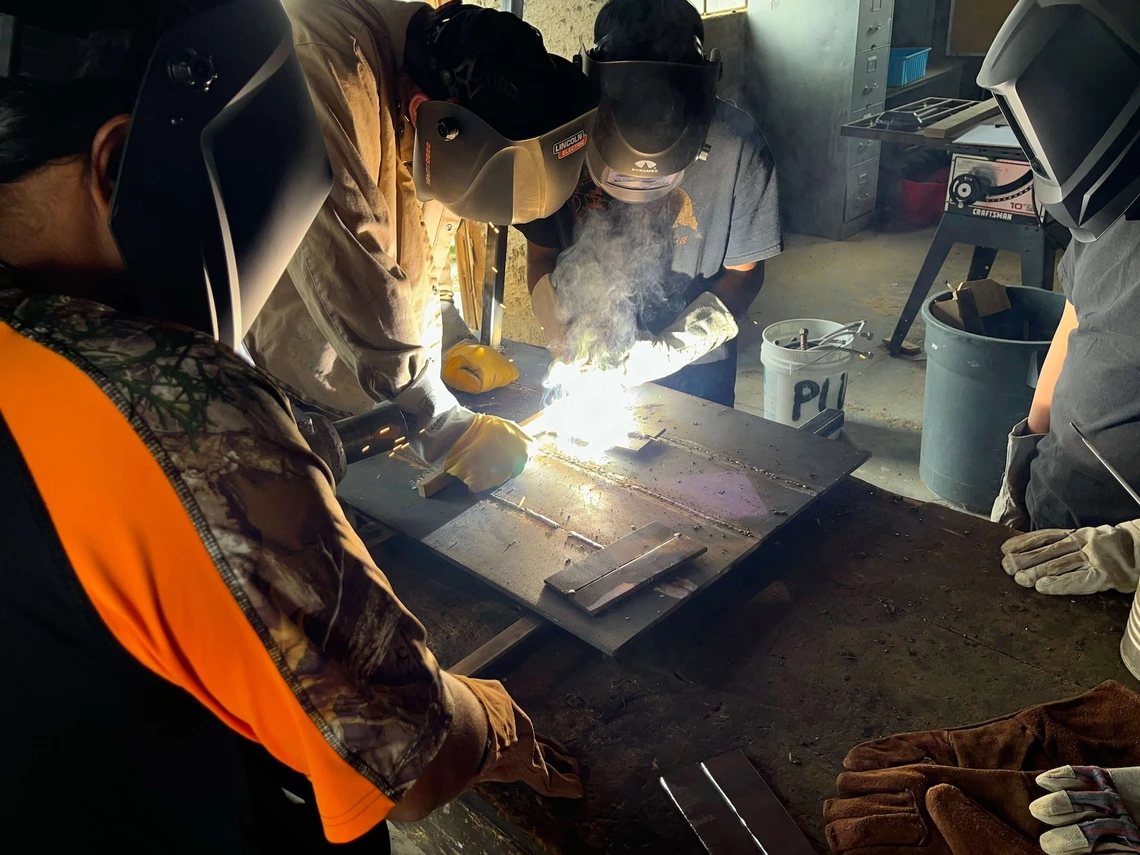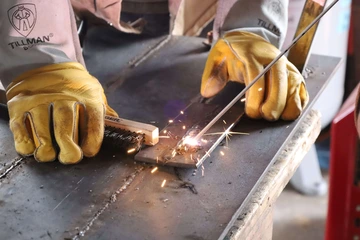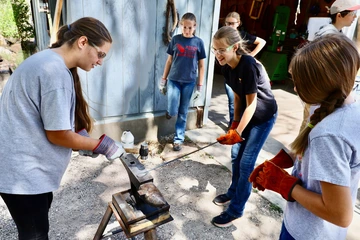4-H metalworking helping youth across Arizona explore
Blacksmithing and welding are spreading statewide, thanks to collaboration among Cooperative Extension staff.

Funding from the Federally Recognized Tribes Extension Program and help from Coconino County Cooperative Extension is giving youths on the Hopi Reservation a chance to learn a valuable skill.
Brad Poole, Cooperative Extension
When Assistant Tribal Extension Agent Susan Sekaquaptewa revived 4-H on the Hopi Reservation in 2019, there wasn’t a lot to offer locally.
Because Hopi communities are spread far from each other, it was challenging for 4-Her’s to get to activities, forcing many to travel long distances, Sekaquaptewa said.
“In this tribal community, for most of the cool, interesting, fun programs, you have to leave the reservation. A lot of the livestock workshops are in Holbrook. Master Gardeners are all in Flagstaff, so I’m really working to build and offer exciting programming in our community, so we don’t have to go anywhere for it,” she said.

Youth on the Hopi Reservation are learning welding, thanks to collaboration between Hopi and Coconino County 4-H.
Brad Poole, Cooperative Extension
Enter Josh Farella, Assistant 4-H Agent in Coconino County, who has spread his welding and blacksmithing projects across the state.
Since part of the Hopi Reservation is in Coconino County, Farella reached out about starting a welding program for Hopi youth. With Farella’s help and money from the U.S. Department of Agriculture’s Federally-Recognized Tribes Extension Program, Sekaquaptewa equipped a shop at the Peace Academic Center, a private school in Kykotsmovi, about 90 miles north of Flagstaff.
The annual package of legislation known collectively as the farm bill funds FRTEP, allowing Extension work across several Arizona tribal nations, including Extension offices on the Hopi, Colorado River Indian Tribes, Hualapai, Navajo and San Carlos Apache reservations. Tribal Extension offers new opportunities for recreation and personal development for members of these communities, Sekaquaptewa said.
The welding program builds confidence and teamwork and teaches practical skills like safety consciousness, she said.
“This is a chance to explore, and I think that’s what 4-H allows youth to do – try experiences and find out where they fit and what gels and what clicks,” she said.
It’s also a viable job skill in an area with few opportunities, Farella said.

Most of the youths in Coconino County 4-H blacksmithing project are girls.
Brad Poole, Cooperative Extension
“You can go into business for yourself making knives. You can do sculpture. You can put skyscrapers together. There’s really no shortage of paths you can take,” he said.
From a small shop on his property outside Flagstaff, Farella teaches kids how to use high-powered presses, forges, hammers and tongs to make knives, trowels, and, on one day this summer, bean trellises for a demonstration garden.
Funds for the metal-working programs come from several sources, including FRTEP, the United Way and the Arizona 4-H Youth Foundation. Some of that money has been used to expand the program into Pima and Greenlee counties and the Hualapaia and San Carlos Apache reservations, Farella said.
During the summer break from school, Particia Bowdler was a Farella’s shop with her daughter, Isabella, 11, for a blacksmithing class. Patricia likes the class, because it’s good for girls to learn skills traditionally thought of as male. She can also apply those skills on their small ranch.
“There are a lot of times when you need to fix things, whether it’s a trailer or a gate or something, and if you know how to weld, why not fix it yourself? She hasn’t fixed anything yet, but she’s not scared of the idea,” Patricia said.
Becca Platte was at the blacksmithing class with her daughter Berea, who is 12, and son Malachai, who is 14.
“A lot of kids feel like they could never do 4-H if it had to be focused on agriculture or livestock … This is something I don’t have to pull teeth to get them to do. This is something that they ask about, that they continue to want to do. They keep brainstorming at home, ‘What can I make next?’” Becca said.
Berea is in her first year of 4-H and blacksmithing. She appreciates the work and skill that goes into making tools, but she doesn’t see a job. She sees art.
“It’s kind of a weird hobby. There’s a ton of creativity. Even though they’re just tools, all the little twists and loops make every single piece different from the others,” she said.
For more information, including a list of people to contact if you want to get involved, see our Arizona 4-H welding and blacksmithing page. For information about other 4-H opportunities, see our statewide 4-H page.

